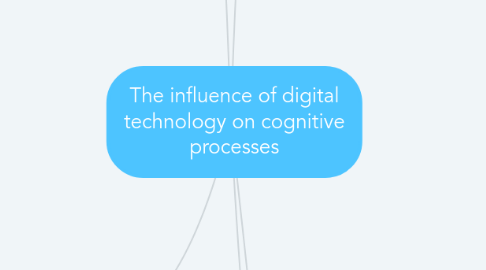
1. Thinking
1.1. Barr et al. (2015)
1.1.1. Research method
1.1.1.1. Lab experiment
1.1.2. Ethical considerations
1.1.2.1. Physical/mental harm: Participants may feel embarrassed with their lack of analytical skill
1.1.2.2. Confidentiality: Has been considered. None of the participant's names were mentioned, and this is needed because y
1.1.3. Aim: To investigate the effect of smartphones to a person's analytical skill.
1.1.4. Procedure: Participants were assessed with cognitively demanding questions including numeracy and verbal intelligence tests and then asked to estimate how much time they spent using their smartphones and how much of that time they spent using internet search engines.
1.1.5. Result: Participants who reported using their smartphones the most had weaker analytical thinking skills and lower knowledge measures.
1.1.6. Conclusion: Although the results show that people who tend to use smartphones had weaker analytical skills, it's not necessarily because of the smartphones. It may simply be that people with poor cognitive ability are more prone to using their smartphone's search capabilities.
2. Research Methods
2.1. Self-report questionnaire
2.1.1. Can identify variables such as how many hours per week a person accesses the Internet
2.1.2. Strength
2.1.2.1. Low cost
2.1.2.2. Responses are not prone to errors of interpretation
2.1.3. Limitations
2.1.3.1. Limited reliability
2.2. Longitudinal studies
2.2.1. Involve repeated observations/experiments over long periods of time to see long-term effects
2.2.2. Limitations
2.2.2.1. Technology changes a lot during a short period of time so it's difficult to collect data
2.3. Experiments
2.3.1. Done to see the relationship between two variables
2.4. Meta-analysis
2.4.1. Researchers consider the results of many previous studies
2.4.2. Strength
2.4.2.1. Low cost
2.4.2.2. Involves many participants so has high generalizability
2.5. Animal research & fMRI scans
2.5.1. Strength
2.5.1.1. Ethical imitations are less restrictive than research with humans
2.5.1.2. fMRI is non-invasive and doesn't result in death
2.5.2. Limitations
2.5.2.1. Usually cannot be generalized to human behavior
3. Ethical Considerations
3.1. Withdrawal
3.1.1. Participants should be allowed to withdraw themselves from any type of study that they are doing due to discomfort or other factors.
3.1.2. Strength
3.1.2.1. Participants will feel comfortable
3.1.3. Limitation
3.1.3.1. Data will not be as accurate since the participants are able to leave halfway through the procedure.
3.2. Confidentiality
3.2.1. Participants' names should not be revealed to the public, especially when the data is published.
3.2.2. Strength
3.2.2.1. Able to protect the participants' identities.
3.2.3. Limitations
3.2.3.1. Researchers may not have access to recalling their names if there has been an anomaly in data collecting
4. Attention
4.1. Stothart et al. (2015)
4.1.1. Aim: To identify if participants' attention are easily distracted by the sound of technology.
4.1.2. Procedure: Participants were allocated into three conditions, call, text message, and no notifications (control). They completed an electronic survey in which they have to fill in their phone number and email. Participants who were allocated into the "call"or "text" condition were doing a task that required a lot of attention in order to succeed. However, when they heard the notification sound, they stopped what they were doing and check what notification they got.
4.1.3. Result: They showed that exposure to notifications from smartphones decreased participants' performance on a concurrent attention-based task.
4.1.4. Conclusion: Cellular notifications can significantly damage performance on an attention-demanding task.
4.1.5. Ethical considerations
4.1.5.1. Confidentiality has been considered in this study as the participants names were not revealed by the experimenter.
4.1.6. Research method
4.1.6.1. Lab experiment; low ecological validity, artificial in nature,
4.1.6.1.1. By using lab experiment, researchers can efficiently obtain results and data.
4.1.7. Critical thinking
4.1.7.1. Participant bias: because of the setting of this study which takes place in a lab where everything is artificial in nature. They will also undergo reactivity so that they are pressured to
5. Memory
5.1. Sparrow at al. (2011)
5.1.1. Aim: To investigate if the Internet has become an enormous transactive memory store.
5.1.2. Procedure: Thirty two undergraduate students at Columbia University (USA) read standardised instruction from a computer screen. Participants had to writer trivial facts into the computer and then read that the information was saved into a folder called Facts (or Data, Info, Names Items, Points). Participants were led to believe that they could access what had been saved. The order of the statements they had written. Participant were then asked general question about each piece of information they had written. Participants were not reminded of the folder names.
5.1.3. Finding; Participants recalled the names of the folders where the information was stored more accurately than the information itself.
5.1.4. Conclusion: These results suggest that processes of human memory are adapting to the advent of new computing and communication technology.
5.1.5. Research Method
5.1.5.1. Lab Experiment: - An experiment that is conducted in a laboratory (in the condition of all the exteriors variable can be control)
5.1.6. Ethical Consideration
5.1.6.1. Right to withdraw: Participants should be able to leave a study at any time if they feel uncomfortable. They should also be allowed to withdraw their data. They should be told at the start of the study that they have the right to withdraw. They should not have pressure placed upon them to continue if they do not want to.
5.1.7. Critical thinking
5.1.7.1. - This might lead to low ecological validity. The participants group was relatively small in number and relatively homogenous. - Cannot be generalised to the wider population. - Weakness in this study's procedure is that remembering full statement is likely to require more cognitive effort than recalling one relatively odd word with the informational statement.

